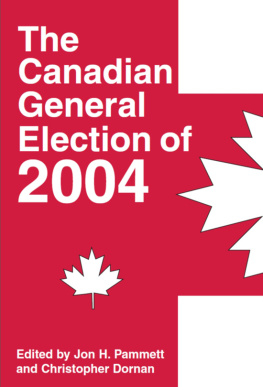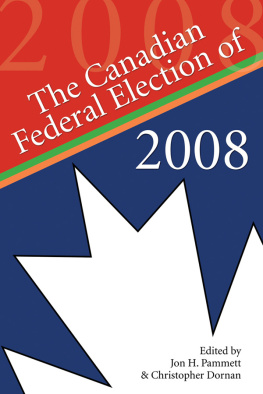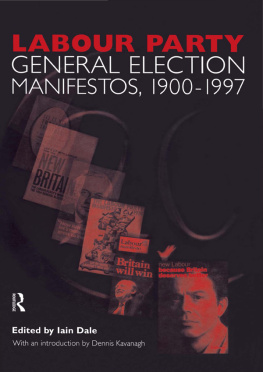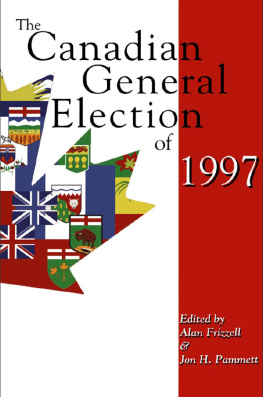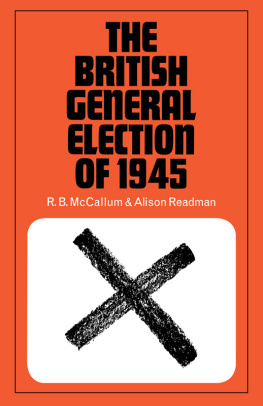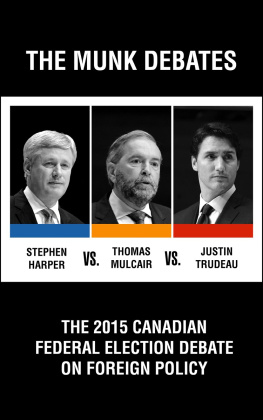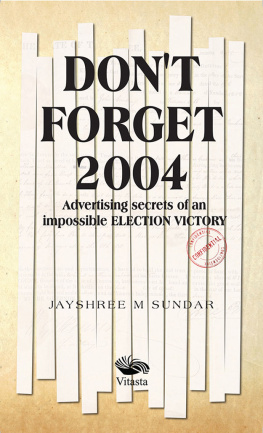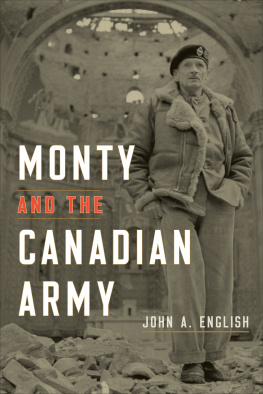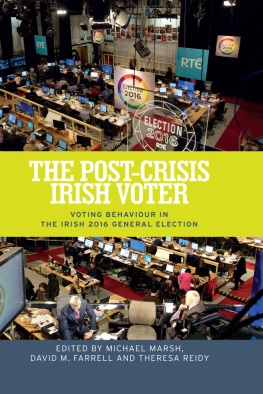Copyright Jon H. Pammett and Christopher Dornan, 2004
All rights reserved. No part of this publication may be reproduced, stored in a retrieval system, or transmitted in any form or by any means, electronic, mechanical, photocopying, recording, or otherwise (except for brief passages for purposes of review) without the prior permission of Dundurn Press. Permission to photocopy should be requested from Access Copyright.
Copy-Editor: Jennifer Bergeron
Design: Jennifer Scott
Printer: AGMV Marquis
Library and Archives Canada Cataloguing in Publication
The Canadian general election of 2004 / edited by Jon H. Pammett and Christopher Dornan.
Includes bibliographical references.
ISBN 1-55002-516-3
1. Canada. Parliament--Elections, 2004. I. Pammett, Jon H., 1944-II. Dornan, Chris
FC635.C366 2004 324.971'071 C2004-906623-4
1 2 3 4 5 08 07 06 05 04
We acknowledge the support of the Canada Council for the Arts and the Ontario Arts Council for our publishing program. We also acknowledge the financial support of the Government of Canada through the Book Publishing Industry Development Program and The Association for the Export of Canadian Books, and the Government of Ontario through the Ontario Book Publishers Tax Credit program, and the Ontario Media Development Corporations Ontario Book Initiative.
Care has been taken to trace the ownership of copyright material used in this book. The author and the publisher welcome any information enabling them to rectify any references or credits in subsequent editions.
J. Kirk Howard, President
Printed and bound in Canada.
Printed on recycled paper.
www.dundurn.com
Dundurn Press
8 Market Street, Suite 200
Toronto, Ontario, Canada
M5E 1M6 | Gazelle Book Services Limited
White Cross Mills
Hightown, Lancaster, England
LA1 4X5 | Dundurn Press 2250
Military Road
Tonawanda, NY
U.S.A. 14150 |
CHAPTER ONE
Election Night in Canada:
The Transition Continues
by Jon H. Pammett and Christopher Dornan
THE CONTEXT OF THE 2004 VOTE
If elections are contests over how the country is to be governed and by whom, then the election of 2004 was an aftershock to a more seismic contest that had been going on for years. By 2002, there were open calls in the media for Prime Minister Jean Chrtien to step down. His opponents within the Liberal party, led by Prime-Minister-in-Waiting Paul Martin, were determined that he should go sooner rather than later. Chrtien and his supporters were equally resolved to remain in power until they decided the time was right to depart. Canadians were treated to a contest over who would govern them during the inter-election period between 2000 and 2004, but not one in which they had any meaningful say.
The fight between Chrtien and Martin was carried out through meetings in hotel rooms, whispers in corridors, harsh words in riding offices, icy stares in Cabinet, and a tremendous trumpet of leaks, counter-leaks, and heated opinions in the press. Not even Liberal Party members got to vote on the outcome. All they got to vote on in the end was a leadership contest between Paul Martin and Sheila Copps. Thus the context for the 2004 campaign was a bitter internecine power struggle within the Liberal Party.
The other crucial feature that set the stage for the 2004 election was the sponsorship scandal, which is described later in this book. This was true not simply because it triggered sustained public outrage and galvanized widespread infuriation with the Liberals, but because it was the first true test of the new Martin regime. How this volatile political problem was handled would surely give the electorate a glimpse of how a Martin government might behave. The Martinite camp had been waiting in the wings for almost two years, unpestered by awkward questions from the media and content to let Chrtien take the barbs from the opposition in the House. They billed themselves as cool and ultra-competent technocrats who, the instant they took power, would install a government of rationalism, expertise, sound judgment, and good management, as opposed to the government of grease and favours and threats run by the wily old codger and his circle of backroom boys.
For political operatives preparing not only to run a government but also to win an election, they had plenty of time to prepare and still fumbled the file badly. It seemed as though they were taken by surprise at the depth and particularly the longevity of the animosity that attached to the sponsorship scandal. It did not blow over. It was as though the Martinites had assumed that the opprobrium would attach to Chrtien and that Canadians would join together in wishing him good riddance. When that did not happen, when it became apparent that the scandal was sticking to the party and more ominously to the new leader, they tripped all over themselves. What Canadians saw was not Paul Martin as unflappable chief executive officer, but the stammering Paul Martin, the one who could not get his tongue around the proper response because the response changed from day to day.
The timeline for the run-up to the 2004 general election went as follows:
In early June 2002, with the drumbeats already out for his resignation, Jean Chrtien delivered a speech in Winnipeg. The Auditor General had by then given advance notice that she would be looking into the allocation of federal sponsorship monies in Quebec. In an unscripted departure from his text, Chrtien allowed that perhaps a few million dollars were stolen, but that the program itself was necessary. I had to make sure the presence of Canada was known in Quebec. He refused to apologize.
Within a fortnight, Paul Martin was no longer in the Cabinet, despite the fact that by this point his supporters had sewn up by far the majority of the Liberals 301 constituency associations. It became obvious that the sitting prime minister could not win this fight if it went to mandatory leadership review.
At almost the same time, Alexa McDonough announced she was stepping down as NDP leader.
In August, Joe Clark announced he would be retiring as leader of the Progressive Conservative Party.
On August 21, Chrtien announced that he would be stepping down as leader of the Liberal Party, but not until February 2004.
Martin then went on tour, outlining his vision on radio call-in shows and at speaking engagements. As a sitting MP, however, he could not be seen to be proposing a legislative agenda that differed from that of his own government. As a result, he spoke in generalities and bromides, while surrendering the legislative agenda to Chrtien, who crafted a series of legacy bills.
In November 2002, in the wake of a series of ethics scandals, and immediately upon the forced resignation of Solicitor General Lawrence MacAuley, Chrtien unveiled an ethics package that would govern the conduct of elected members of Parliament and senators. Other initiatives included an Aboriginal governance package, the ratification of the Kyoto agreement, a promise to fix health care, and a measure to decriminalize possession of small amounts of marijuana.



